Merkel traveled to Auschwitz on Friday, her first visit to the notorious Nazi concentration camp in her 14 years as leader. The trip came amid rising anti-Semitism in Germany and was designed as a strong gesture in the fight against it."It is anything but easy to stand here before you and to speak with you. I am filled with deep shame in the face of the barbaric crimes that were here committed by Germans. Crimes that are unfathomable," she said.Merkel emphasized that Auschwitz was a German extermination camp, run by Germans, adding: "It is important that we clearly identify the perpetrators, we Germans owe this to the victims and we owe it to ourselves." "We must never forget — we cannot draw a line, nor can we allow a trivialization of Holocaust," she said, urging people to stand up to hate speech and anti-Semitism.''We must not close our eyes and ears. When people are being verbally abused, humiliated or isolated … we have to stand up," she said. 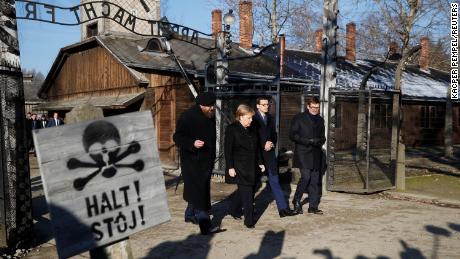 Touring the memorial, the Chancellor held a moment of silence at the so-called Black Wall in the main camp at Auschwitz, where thousands of prisoners were shot dead.She also visited the Birkenau extermination camp, about a mile from the main Auschwitz camp, where she laid a wreath of flowers. Poland's Prime Minister Mateusz Morawiecki and President Andrzej Duda accompanied her during the visit.As part of her visit, Merkel also officially announced Germany would provide additional €60 million ($67 million) in funding for the conservation of the memorial, saying it will be forever the responsibility of the German nation to ensure the victims are remembered."Remembering the crimes … is a responsibility which never ends. It belongs inseparably to our country. To be aware of this responsibility is part of our national identity," she said.Auschwitz survivor Bogdan Stanislaw shared his memories of arriving to the death camp as a 12-year-old boy with Merkel and the other guests attending the event."In January 1945 we were rushed to the railway station — I was rushing to the bath holding my mother's hands. We were asking when will be free?," he said. "The older inmates would laugh at us and said 'can you see the chimneys?' this is the way to get out. There is no other way out.''Related: CNN poll reveals depth of anti-Semitism in Europe
Touring the memorial, the Chancellor held a moment of silence at the so-called Black Wall in the main camp at Auschwitz, where thousands of prisoners were shot dead.She also visited the Birkenau extermination camp, about a mile from the main Auschwitz camp, where she laid a wreath of flowers. Poland's Prime Minister Mateusz Morawiecki and President Andrzej Duda accompanied her during the visit.As part of her visit, Merkel also officially announced Germany would provide additional €60 million ($67 million) in funding for the conservation of the memorial, saying it will be forever the responsibility of the German nation to ensure the victims are remembered."Remembering the crimes … is a responsibility which never ends. It belongs inseparably to our country. To be aware of this responsibility is part of our national identity," she said.Auschwitz survivor Bogdan Stanislaw shared his memories of arriving to the death camp as a 12-year-old boy with Merkel and the other guests attending the event."In January 1945 we were rushed to the railway station — I was rushing to the bath holding my mother's hands. We were asking when will be free?," he said. "The older inmates would laugh at us and said 'can you see the chimneys?' this is the way to get out. There is no other way out.''Related: CNN poll reveals depth of anti-Semitism in Europe
How many German leaders have gone to Auschwitz?
Merkel is only the third German Chancellor to visit the site of the death camp, which operated in Nazi-occupied Poland. Helmut Schmidt was the first to go in 1977, followed by Helmut Kohl in 1989 and 1995.The memorial was also visited in the past by several German Presidents, who act as ceremonial heads of state.Stefanie Schüler-Springorum, who heads the Center for Research on anti-Semitism at the Technical University of Berlin, said a visit by a German leader to Auschwitz is still "very much a significant event.""It's a statement," she said. "Angela Merkel is very conscious of what she is doing, these are her last years in office, and it's important for her to go."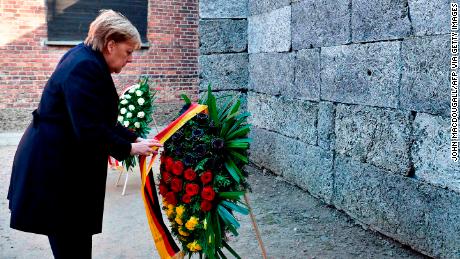 Marie-Sophie Adeoso from the Anne Frank Educational Center in Frankfurt added that Merkel's visit is very much needed. "I find it astonishing that in almost 25 years, no German Chancellor has visited Auschwitz," she said. "It's something that needs to be done … anti-Semitism is real in Germany nowadays and it's [important to] keep reminding us the historical legacy that we as Germans are carrying."
Marie-Sophie Adeoso from the Anne Frank Educational Center in Frankfurt added that Merkel's visit is very much needed. "I find it astonishing that in almost 25 years, no German Chancellor has visited Auschwitz," she said. "It's something that needs to be done … anti-Semitism is real in Germany nowadays and it's [important to] keep reminding us the historical legacy that we as Germans are carrying."
Why has it taken her so long?
While it will be her first visit to Auschwitz, Merkel has visited several Holocaust memorial sites in the past, including the Yad Vashem World Holocaust Remembrance Center in Jerusalem."It's always a question of where you go when you want to do this kind of symbolic remembrance and Angela Merkel went several times (to) Yad Vashem to do this, that is probably one of the reasons, I think, why she hasn't been to Auschwitz yet," said Magnus Brechtken, the deputy director of the Leibniz Institute for Contemporary History. 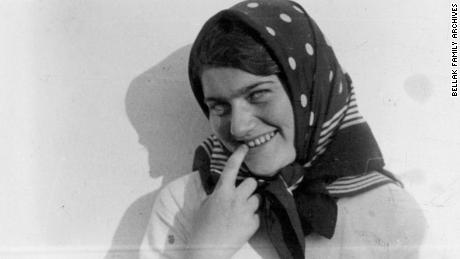 Merkel has visited Israel several times and in 2014, she received the country's highest civilian award for her "fight against anti-Semitism and racism in particular through education."In 2009, she accompanied President Barack Obama and the Nobel Laureate and Holocaust survivor Elie Wiesel to the site of Nazi concentration camp Buchenwald near Weimar, central Germany.In 2013, she was criticized after visiting the Dachau concentration camp during an election campaign.
Merkel has visited Israel several times and in 2014, she received the country's highest civilian award for her "fight against anti-Semitism and racism in particular through education."In 2009, she accompanied President Barack Obama and the Nobel Laureate and Holocaust survivor Elie Wiesel to the site of Nazi concentration camp Buchenwald near Weimar, central Germany.In 2013, she was criticized after visiting the Dachau concentration camp during an election campaign. 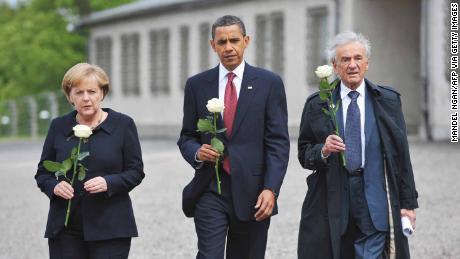
Why is it still such a big deal?
Earlier this year, German Jews were warned by a leading government official not to wear traditional kippahs in public settings because of safety concerns following the rise in anti-Semitic attacks.In October, a gunman in Halle killed two people while attempting to storm a synagogue on Yom Kippur, the holiest day in the Jewish calendar.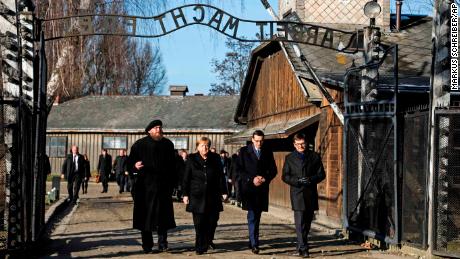 "After the attempted mass murder of Jews in Halle all must be done that underlines the determination of the German authorities to combat anti-Semitism practically and symbolically wherever they can," Wolf Kaiser, historian and a member of the German delegation to the International Holocaust Remembrance Alliance, told CNN in an email.Read More – Source
"After the attempted mass murder of Jews in Halle all must be done that underlines the determination of the German authorities to combat anti-Semitism practically and symbolically wherever they can," Wolf Kaiser, historian and a member of the German delegation to the International Holocaust Remembrance Alliance, told CNN in an email.Read More – Source







